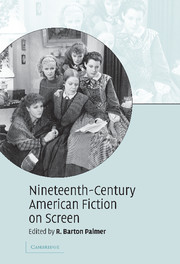Book contents
- Frontmatter
- Contents
- List of illustrations
- Notes on contributors
- Acknowledgments
- Introduction
- 1 A very American fable: the making of a Mohicans adaptation
- 2 Romancing the letter: screening a Hawthorne classic
- 3 The movies in the Rue Morgue: adapting Edgar Allan Poe for the screen
- 4 Readapting Uncle Tom's Cabin
- 5 Screening authorship: Little Women on screen 1933–1994
- 6 Melville's Moby-Dick and Hollywood
- 7 Screening male sentimental power in Ben-Hur
- 8 John Huston's The Red Badge of Courage
- 9 Translating Daisy Miller
- 10 Jane Campion's The Portrait of a Lady
- 11 The Europeans – and the Americans
- 12 Sister Carrie becomes Carrie
- 13 Hollywood and The Sea-Wolf
- 14 An untypical typicality: screening Owen Wister's The Virginian
- Filmography
- Index
3 - The movies in the Rue Morgue: adapting Edgar Allan Poe for the screen
Published online by Cambridge University Press: 22 December 2009
- Frontmatter
- Contents
- List of illustrations
- Notes on contributors
- Acknowledgments
- Introduction
- 1 A very American fable: the making of a Mohicans adaptation
- 2 Romancing the letter: screening a Hawthorne classic
- 3 The movies in the Rue Morgue: adapting Edgar Allan Poe for the screen
- 4 Readapting Uncle Tom's Cabin
- 5 Screening authorship: Little Women on screen 1933–1994
- 6 Melville's Moby-Dick and Hollywood
- 7 Screening male sentimental power in Ben-Hur
- 8 John Huston's The Red Badge of Courage
- 9 Translating Daisy Miller
- 10 Jane Campion's The Portrait of a Lady
- 11 The Europeans – and the Americans
- 12 Sister Carrie becomes Carrie
- 13 Hollywood and The Sea-Wolf
- 14 An untypical typicality: screening Owen Wister's The Virginian
- Filmography
- Index
Summary
Poe's paradoxical popularity
Type the name Edgar Allan Poe (1809–49) into the search facility of the Internet Movie Database (www.imdb.com) and you will discover that there have been 141 cinema and television films based, to varying degrees, on Poe's works. This is more than Herman Melville (25 entries in the database), Henry James (67) and even Mark Twain (83). While not an entirely scientific exercise, this does suggest that Poe is the most-filmed American author of the nineteenth century.
Bare statistics, however, only tell us so much. Poe is a uniquely popular figure for the screen industry. But, in comparison with other major authors, it is to a greater than usual extent and with greater than usual frequency that feature-film and television versions of Poe's works depart radically from the texts from which they claim to originate. This is clear from my own viewing, and from books such as Ronald L. Smith's Poe In The Media (1990) and Don G. Smith's comprehensive critical filmography The Poe Cinema (1999).
Usually when one watches a screen adaptation of a familiar literary text, one looks for changes to the storyline, details that have been modified, and characters that have been conflated or dropped completely. With Poe adaptations, it is sometimes more a question of spotting the few details, characters, and elements of plot that have been retained at all. Rather than adaptations, many are best described simply as new stories featuring a scattering of Poe's ideas.
- Type
- Chapter
- Information
- Nineteenth-Century American Fiction on Screen , pp. 43 - 61Publisher: Cambridge University PressPrint publication year: 2007
- 3
- Cited by



